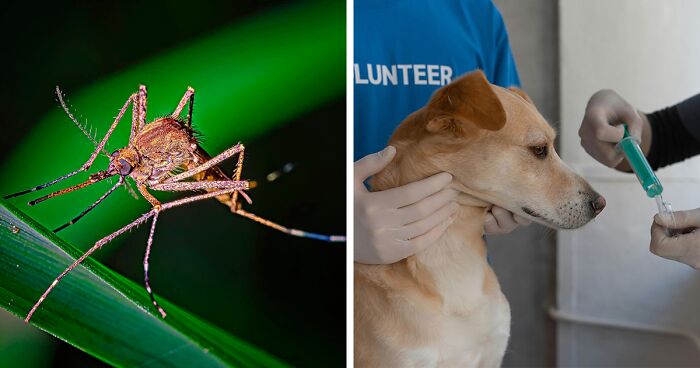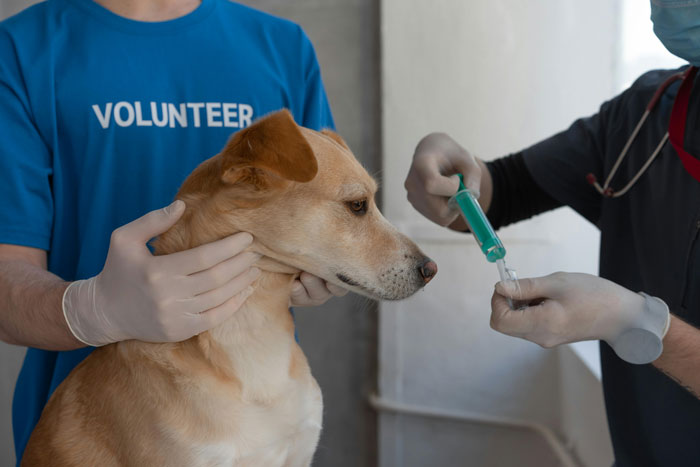Heartworm disease is a serious condition. It is caused by a parasite named Dirofilaria immitis. This disease mainly affects dogs but can also harm other animals. Mosquito bites spread it, making dogs sick with heart failure, lung disease, and damage to other organs.
The danger of heartworm disease shows why preventing it is key. Pet owners must watch their pets’ health closely. Early detection and treatment can greatly help. That’s why regular vet visits and heartworm tests are crucial for keeping dogs healthy.
- Heartworm disease, caused by Dirofilaria immitis, is spread by mosquitoes and can lead to heart failure in dogs.
- Over 70 types of mosquitoes can transmit heartworm disease, making it a widespread issue globally.
- Early symptoms of heartworm in dogs include a mild cough and fatigue, while advanced stages can cause severe health issues.
- The American Heartworm Society recommends annual testing for dogs over seven months old to catch infections early.
- Treatment for heartworm involves multiple steps including the FDA-approved drug melarsomine, with post-treatment rest crucial.
The information provided herein is for informational purposes only. Please refer to our disclaimer for more details..
- The Role of the Mosquito in Heartworm Disease
- Recognizing the Symptoms of Heartworm Disease
- The Importance of Early Detection in Heartworm Disease
- Diagnostic Procedures for Heartworm Disease in Dogs
- Treatment Options for Heartworm Disease
- Heartworm Prevention in Dogs
- The Role of the American Heartworm Society and Other Expert Bodies
- Conclusion
The Role of the Mosquito in Heartworm Disease
Mosquitoes play a key role in spreading heartworm disease to dogs. Understanding how this happens is important for prevention.
The Heartworm Life Cycle
- Initial Infection: Mosquitoes bite an infected animal and pick up heartworm larvae.
- Development within Infected Mosquito: These larvae grow into a form that can infect dogs, inside the mosquito.
- Transmission to Dogs: When this infected mosquito bites another dog, it leaves the larvae on the dog’s skin. Then, the larvae get into the dog’s bloodstream.
- Maturation: They travel to the dog’s heart and lungs and mature into adult heartworms. This can make the dog very sick.
Mosquito Species and Heartworm
- More than 70 kinds of mosquitoes can spread heartworm.
- This disease is a problem in many places around the world because so many mosquitoes can carry it.
Recognizing the Symptoms of Heartworm Disease
Recognizing the symptoms in dogs with heartworm and knowing the importance of early detection is key to managing and treating it effectively. This disease can get worse over time, with symptoms ranging from mild to very serious.
Early Symptoms
At first, dogs may show no signs or just mild symptoms that are easy to miss. As the disease gets worse, you might see:
- A light, ongoing cough
- Tiredness, especially after some activity
- Not wanting to exercise
- Less hunger, which might lead to losing weight
These signs mean the heart and lungs are starting to suffer because of heartworms.
Advanced Symptoms
As the disease gets more serious, symptoms become worse and can lead to dangerous health issues. Look out for:
- A big drop in how much exercise the dog can handle
- Severe coughing, sometimes with blood
- Hard time breathing or breathing fast while resting
- Signs of heart failure, like a bigger liver, fluid in the belly, and an uneven heartbeat
In the worst cases, a dog might have caval syndrome. This is a sudden blockage of blood flow, causing collapse and possibly quick death if not treated right away.
Stages of Heartworm Disease
The seriousness of heartworm disease is put into four classes based on symptoms, test results, and how much it affects the dog’s health:
- Class I: No symptoms or very mild ones, like rare coughing and a little trouble with exercise.
- Class II: Mild to moderate symptoms, including ongoing cough and tiredness after light activity.
- Class III: Severe symptoms, such as a lot of tiredness, big weight loss, hard time breathing, and signs of heart failure.
- Class IV (Caval Syndrome): The most serious stage that needs quick medical help because it can lead to death from heart problems.
It’s very important for dog owners to watch their pets’ health and get veterinary care if they notice any signs of heartworm disease. Finding it early through regular checks can greatly improve a dog’s chance of getting better. The American Heartworm Society and vets suggest yearly testing to find and manage this serious condition early.

The Importance of Early Detection in Heartworm Disease
This disease gets worse over time, often starting with no clear signs. If not found and treated early, it can cause serious problems or even death.
Annual Testing Recommendations
- Dogs older than seven months need a test every year before they start taking medicine to prevent heartworms.
- The preventive medicines don’t kill adult heartworms.
- Giving preventives to a dog that already has heartworms can be very dangerous or deadly.
For Dogs with Lapsed Prevention:
- If a dog hasn’t taken its preventive medicine on time, it should be tested right away.
- A second test six months later checks if the dog got heartworms during the time they weren’t protected.
Geographic Consideration
- Heartworm disease is spreading quickly across the U.S. This means all dogs need to be tested every year and use preventive medicine all year, no matter where they live.
Severity Factors in Heartworm Disease
The disease’s seriousness depends on how many worms are in the dog, how long the dog has been infected, and how active the dog is.
Early Detection Benefits
- Finding the disease early greatly improves the chances of successful treatment.
- It also stops the disease from getting to a stage where it causes more serious health issues.
Diagnostic Procedures for Heartworm Disease in Dogs
Finding out if a dog has heartworm disease means doing several tests. Here’s how these tests work:
Initial Blood Tests
Antigen Tests: These tests detect heartworm protein. They look for proteins from adult female heartworms. They work best 6 months after the dog gets infected. These tests aren’t for dogs under 6 months old because the worms aren’t grown up yet.
Microfilaria Tests: These tests check for heartworm babies in the blood. There are a few ways to do this:
- Modified Knott test
- Filter method
- Direct smear
Imaging Techniques
- Radiography (X-Rays): This shows if there are changes in the heart and lungs from heartworms, like a bigger heart or hurt blood vessels in the lungs.
- Echocardiography: This is an ultrasound for the heart. It can show heartworms in the heart or blood vessels, really helping with sick dogs.
Guidelines and Recommendations
- Testing Guidelines: Dogs older than 7 months should get tested before they start taking medicine to prevent heartworms. They also need a test every year to catch any infection early.
- American Heartworm Society Guidelines: These rules stress how important regular tests are to stop, find, and treat heartworm infections.
Treatment Options for Heartworm Disease
Treating heartworm in dogs is complex. It involves several steps and medicines, like the FDA-approved melarsomine (Immiticide).
Treatment Phases
Pre-Treatment Stage: First, stabilize the dog if they show heartworm symptoms. This may include giving medicines to improve health before starting the main treatment.
Adulticide Treatment: The key step is using melarsomine dihydrochloride to kill adult heartworms. Dogs may get one to three shots in the back muscles. The plan depends on the dog’s health and the severity of the infection.
Post-Treatment Care: After treatment, it’s crucial for the dog to rest a lot. This helps avoid serious complications as the dog’s body clears out the dead worms. Keeping the dog calm and still is very important.
Potential Complications
Treatment can cause problems, like pulmonary thromboembolism. This happens when dead heartworms break down. It’s a serious risk, making it important to watch the dog closely after treatment. Side effects, like pain or swelling at the shot site, can also happen.
Importance of Post-Treatment Testing
About 9 months later, a test to check for heartworms is needed. Keeping up with heartworm prevention medicine is key to stop new infections.
Treating heartworm in dogs needs careful steps: stabilizing, treating, and aftercare. Following the American Heartworm Society’s advice and working with a vet is essential for success.
Heartworm Prevention in Dogs
Stopping heartworm disease in dogs is key for their health. It means prevention medication and doing regular checks.
Preventive Medications
Dogs can take different kinds of medicine to stop heartworms. These work well if given right and on time:
- Monthly Chewable Pills: Dogs like these because they taste good.
- Topical “Spot-On” Medications: You put these on the dog’s skin. They also guard against fleas and ticks.
- Injectable Medications: A vet gives these shots, which last for 6 or 12 months. This way, your dog stays protected for a longer time.
All these medicines stop heartworm larvae from growing up. Talk to your vet to pick the best one for your dog. Think about your dog’s health and where you live.
Importance of Regular Testing
Testing dogs for heartworms regularly is very important:
- Early Detection: Tests find heartworms early. This makes treatment more likely to work.
- Year-Round Protection: Heartworms are in all 50 states. Mosquitoes spread them and can be around any time of year. That’s why dogs need protection all the time.
- Annual Testing: Test your dog every year. This makes sure the medicine is working. If you miss a dose, your dog could get heartworms.
So, protecting dogs from heartworms means giving them the right medicine and testing them every year.
The Role of the American Heartworm Society and Other Expert Bodies
The American Heartworm Society (AHS) helps vets and pet owners with heartworm disease advice. They update their guidelines often, based on new research.
Prevention Recommendations
AHS says it’s very important to protect dogs from heartworms all year, no matter where they live. Since heartworms are found in all 50 states, vets need to know how high the risk is in their area. The AHS suggests using medicines that kill heartworm larvae and trying to keep mosquitoes away from pets. This two-step plan helps keep dogs safe from heartworms.
Testing and Diagnosis Guidelines
AHS believes in testing dogs for heartworms every year. This is key, even if your dog takes preventive medicine, because no medicine works 100% of the time. Finding heartworms early means better chances of getting your dog well again.
Treatment Protocols
If a dog has heartworms, AHS has a plan to help. First, make sure the dog really has heartworms with more tests. Then, keep the dog calm and limit exercise. Give the right treatment based on how bad the infection is. After treatment, check again to make sure the heartworms are gone. Keep using prevention medicine all year to stop new infections.
Conclusion
Knowing about heartworms, stopping them before they start, and acting fast are important for keeping dogs healthy. By using the American Heartworm Society’s advice, preventing heartworms, and checking for them often, pet owners can lower the chances of heartworm disease and its problems.
324views
Share on Facebook
 Dark Mode
Dark Mode 

 No fees, cancel anytime
No fees, cancel anytime 



 Image credits:
Image credits:  Image credits:
Image credits: 










































5
0